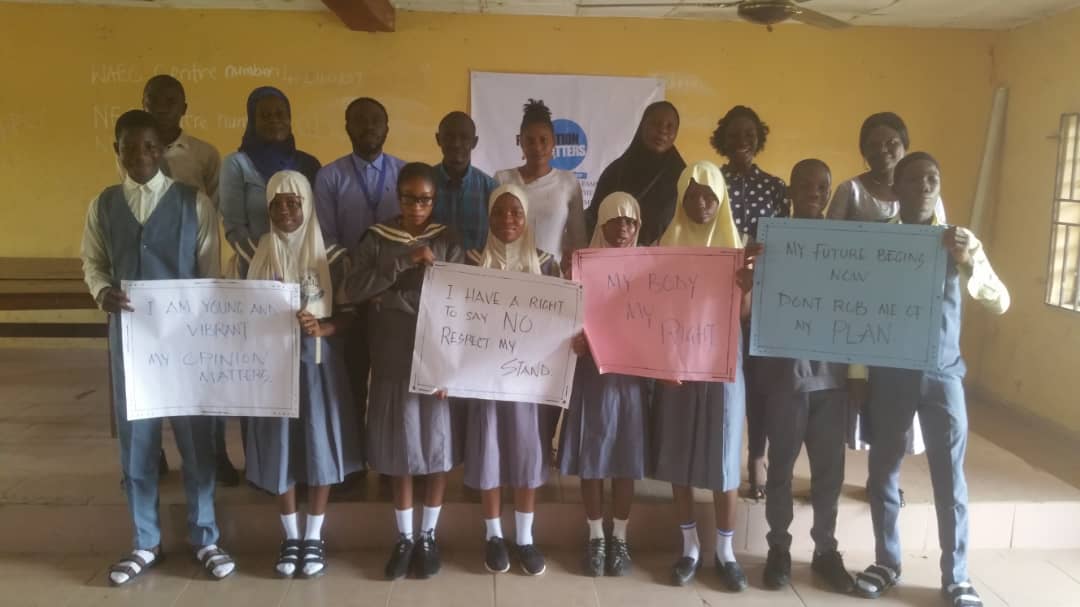
By Rasheedat Oladotun Iliyas
Fifteen-year-old Jemila sat quietly on a hospital bed, her newborn nestled in her lap. She studied the tiny face before gently laying the baby in a cot. A sigh escaped her lips, half relief, half uncertainty.
For Jemila, what began as an innocent relationship with a classmate soon turned into a life-changing pregnancy. Both she and her boyfriend were suspended from school, but while he quickly found his way back into education, Jemila stayed home for nine long months. Now a teenage mother, her future is shaped less by her ambitions and more by her circumstances.
Jemila’s story is far from unique. Across Nigeria, thousands of girls like her see their dreams abruptly derailed by teenage pregnancy. Many girls in her situation are pressured into early marriage, often in polygamous households, while others become single mothers struggling to survive.
Only a few ever return to school. Instead, they face stigma, lost opportunities, and economic hardship that ripple across generations. Their children, too, battle poor health, malnutrition, and limited educational prospects.
Interconnectivity Between Teenage Pregnancy and Population Explosion
Available data has shown that teenage pregnancy is not just a private struggle, it is a public health and development crisis. This is because 23% of girls between the ages of 15 and 19 have begun child bearing, 17% already had their first child, and 5% are pregnant with their first child. A 2023 study by Okara Amarachi et al revealed that lack of access to contraception and Sexual and Reproductive Health, SRH education by adolescents is the major reason for unplanned pregnancies. Therefore, efforts to improve access to education and SRH services, particularly in rural and underserved areas, are necessary to reduce teenage pregnancy rates.
Delayed antenatal care, poor nutrition, and limited access to health services leave many teenage mothers and their babies vulnerable.
The result is higher rates of maternal and infant mortality, low birth weight, and lifelong socio-economic disadvantages.
A 2023 study published in PubMed Central highlighted that addressing adolescent pregnancy requires more than punitive measures. Laws against child marriage, access to contraceptives, and, critically, comprehensive sexual and reproductive health (SRH) education are all vital. Without them, young people are left navigating puberty, relationships, and sexuality without the tools to make safe choices.
It is therefore necessary to consider teenage pregnancy as more than a health issue, but a barrier to national development as it perpetuates cycles of poverty, reduces workforce participation, and undermines Nigeria’s efforts to achieve gender equality and sustainable growth.
But when young people are empowered, through education, safe spaces, and supportive systems, the story changes. They can dream bigger, stay in school longer, and contribute meaningfully to society.
CISLAC, PopMatters Champions Population Planning Conversation
It is a fact that Nigeria’s future prosperity hinges on how well it manages its population growth. This formed the basis for the nationwide survey by the Civil Society Legislative Advocacy Center and Population Matters UK in 2023 which exposed glaring gaps in population and budget planning, including adolescent health. The message was clear, if Nigeria is true to her development plans, teenage pregnancy must be at the center of its population planning strategies.
The survey result birthed strategic regional interventions where civil society organisations and the media were empowered to engage stakeholders and enlighten community members on the importance of population planning and their role in it.
With this development, for the first time, the conversation on Nigeria’s population has begun as key stakeholders expressed commitment to become advocates of a paradigm shift in socio-cultural and religious beliefs which had hitherto fueled unplanned population growth.

The Power of School-Based SRHR Clubs
One innovative response borne out of this sensitization campaign was the Sexual and Reproductive Health Rights School Club championed by the North Central Group of PopMatters. The club which aims to curb the increasing cases of school dropouts due to pregnancies and rape, as well as other challenges, is taking root in Kwara State, North Central Nigeria.
At Five Way Secondary School in Ilorin, a pioneering Sexual and Reproductive Health and Rights, SRHR Club has given students something invaluable – knowledge, voice, and community.
Ten student ambassadors, backed by the school management, lead peer-to-peer discussions on everything from puberty and consent to menstrual hygiene and contraception. They learn how to identify sex predators, report abuse, and protect their rights. They also gain confidence to stand up for themselves and their peers.
Through regular interface and workshops, the club is transforming silence into dialogue and fear into empowerment. The club is not just about avoiding pregnancy, it is about building a culture of population awareness, respect, dignity, and responsibility.
The success of this pilot is already inspiring plans to scale the initiative across other schools, with the potential to serve as a national model.
Beyond the Classroom: Kwara’s Adolescent Health Care Center
Another development complementing the school-based intervention is the launch of an Adolescent Health Care Center dedicated to the unique needs of teenagers by the Kwara State Government. This initiative is laudable as it provides a safe place for adolescent girls, a cause being championed by North Central Group.
Adolescence often comes with pressure, confusion, and limited guidance. Many young people do not know where to turn for confidential advice on sexuality, mental health, or even basic hygiene.
The center changes that. It offers counseling, reproductive health services, mental health support, and preventive care, all in a safe and youth-friendly environment. By working with schools, parents, and local health systems, the center ensures that support does not stop at the classroom door. It becomes a holistic safety net for young people navigating one of life’s most delicate stages.
The Roadmap to 2030
By 2030, Nigeria is projected to have the highest population of adolescent girls between the ages of 10 and 17. Also, the country’s population is predicted to reach approximately 401.3 million by 2050, about double the country’s present population as at 2025.
Therefore, if Nigeria is to meet global targets, bold and coordinated action must be made to curtail unplanned pregnancies.
The introduction of school based clubs on SRHR is one of the answers to checking this exponential growth in population. This enables adolescents to have age-appropriate sexual and reproductive health knowledge.
Establishment of more Adolescent Healthcare Centers across the State will also allow teenagers, particularly girls, have access to confidential, affordable, and stigma-free SRH services.
Priority must also be given to girlchild education as it has been proven to prevent early child marriage and empower girls to make informed choices. Hence, establishment of more schools, particularly in rural areas where cases of teenage pregnancy and early marriage still persist, is necessary.
Sensitizing parents, religious and traditional leaders, as well as social media influencers to normalize conversations on sexual and reproductive health and challenge harmful norms is also key.

More importantly, the Population Conversation must be sustained and tempo increased to engender conversations on population planning and drive government’s attention to key issues for informed policies.
For instance, the National Health Insurance Policy is a key driver for population control. The ongoing drive to register more enrollees, particularly the informal sector, is the right step in the right direction. The policy which allows a family to register only four children under the scheme sends a strong signal to young people about birth control and smaller family size.
Investing in Nigeria’s Youth
The establishment of SRHR school clubs and adolescent health centers is not just a health intervention; it is a strategic investment in Nigeria’s future. By breaking the cycle of teenage pregnancy, Nigeria safeguards its development, ensures better population planning, and nurtures a generation of educated, healthy, and empowered youth.
Jemila’s story does not have to be the story of millions. With the right support, Nigeria’s young people can rewrite their futures by choosing education over early motherhood, opportunity over poverty, and dignity over despair.
End

